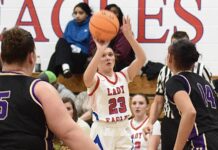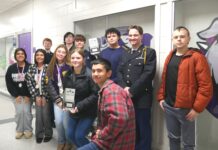WEST POINT – The West Point High School Scholar’s Bowl team is quickly establishing itself as a force to be reckoned with, not just in Cullman County or in the state of Alabama, but throughout the nation.
The WPHS Scholar’s Bowl team competes in tournaments from Chicago, Illinois all the way to Hoover, Alabama. The location of the competition may change, but the results don’t: the WPHS Scholar’s Bowl team dominates schools from around the nation, and thrives against larger schools that expect to crush West Point.
Last year the 5A West Point team went 6-1 against 7A competition, including wins against Hoover and last year’s overall state champion, Gadsden City. Led by coach Lee Henry, in his third year with West Point High School, and seniors Nick Roman and Thallie Schaffer, the Scholar’s Bowl team finished last year ranked 7 in the nation among small schools.
“And ‘small schools,’” explained Coach Lee Henry, “is defined as any school with 500 students or less in grades 10-12. So, although we’re not a small school in Alabama, on the national stage we are considered a small school.”
Here’s the scary thing for anyone in the state hoping to dethrone the mighty Warriors: they’re returning every player from last year’s team. The starters, or the ‘A-Team’ as Coach Henry calls them, include the amentioned seniors Thallie Schaffer and Nick Roman, along with juniors Zakkary Waddell and Ross Wallace.
Coach Lee Henry is no newcomer to the world of the Scholar’s Bowl. He has been coaching teams for 17 years, which includes a stint in Huntsville City before he arrived at West Point, as well as coaching his school’s middle school Scholar’s Bowl team when he was in high school himself.
“I’ve been doing this long enough,” Henry said, “I know what they’re going to ask.”
Senior Nick Roman is also on the West Point cross country and track team, and he related the physical sport of running and endurance with the mental sport of Scholar’s Bowl with the amount of work and training that goes into both of them.
For Roman, training for cross country and track means being at the school four days a week at 5:30 a.m. Training for Scholar’s Bowl for him means after school practice with the team, drilling himself on facts located in the notes that the team meticulously studies.
When asked what the most challenging part of training for the Scholar’s Bowl is, the team unanimously decided it was learning the notes. “There are 400 notes for this year,” Roman said.
“Sometimes,” Coach Henry chimed in, “I’ll bust out notes from the previous years. I always keep track of the one’s they miss and quiz them on those the next day.” Some might think that training for a Scholar’s Bowl might be just like another class just with more extreme and embarrassing consequences for not doing well.
The team vehemently disagrees with that notion.
When I asked the kids if they thought being on the Scholar’s Bowl team was like being in just another class, a voice that had been quiet throughout my interview with the intellectual studs spoke up.
“No,” said Anna Watson, sitting at the far end of the table, “It’s like a competition, you have to train for it.”
A few year’s ago, ESPN did a mini-series on television following Hoover High School’s football team called Two-A-Days. I can’t help but think these kids deserve a show of their own.
I watched as they fired up the buzzers, which they use to alert to the judge, in this case Coach Henry, that they have the answer and can answer the question. The A-Team was going to face off against what I’m assuming was the B-Team or JV.
Either way, Coach Henry began reciting the questions from a piece of paper, prefacing the round of trivia by telling the team members “Y’all haven’t had these questions before.”
I watched as the A-Team reeled off answer after answer, ranging from Fredrick the Great, to 5/9.
Yeah, the intellectual studs have to know how to do math, too.
“I push them hard,” Coach Henry said, “But they do a good job and they work hard. I don’t tell them that enough. They could always be better, though.”
As Coach Henry and I followed the kids out of the classroom and into the hall for a photo, he told me that that definitely wasn’t their best.
“They must’ve been nervous,” Henry said. The A-Team won 480-20. The thought of those players getting better at what they do should be a scary one.




















